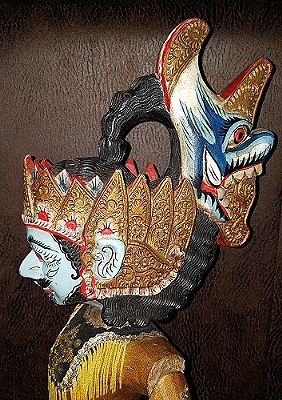Gandamana
| Title | Gandamana - (Patih) - Mahabharata |
|---|---|
| Other names | ... |
| Size | 60 cm |
| Personal data | Arya Gandamana is the crown prince of the Pancala country. Son of Prabu Gandabayu with his queen Dewi Gandarini. Arya Gandamana has an older sibling named Dewi Gandawati. |
| Appearance | Arya Gandamana has a handsome face, dashing, sturdy, quiet, brave, strong and powerful and has the knowledge of Aji Bandungbandawasa and Glagah Pangantol-atoll. |
| Collection | Private collection |
Gandamana - (Patih) - Mahabharata
Arya Gandamana is an incomparable warrior. He once suffered from an incurable disease. The disease was only cured after he made a vow, taking an oath not to become king according to Dewata's idea. Gandamana then went to serve the Astina country before Prabu Pandu, and was appointed governor of the Astina country. He held this position until he had to leave the country of Astina because of Sakuni's betrayal.
When his father, Prabu Gandabayu died, Gandamana remained steadfast in his vows. Arya Gandamana gave up his right to be king to his brother-in-law, Arya Sucitra, who became king of Pancala with the title Prabu Drupada.
The end of Gandamana's history is told. According to the Mahabharata, Gandamana died in the battle against Bima during the invasion of the Kaurava and Pandava children into the Pancala country on the orders of Resi Durna. Meanwhile, according to puppetry, Gandamana died in the battle against Bima when he was carrying out a Pasanggiri/sparring competition in an effort to find a mate for Dewi Drupadi.
Raden Gandamana
Raden Gandamana is the son of Prabu Gandabayu, the king of Cempalareja. He is powerful and powerful... At the time of the Kingdom of Cempalareja, the kings of other countries came to propose to his daughter, Goddess Draupadi. Their arrival was perceived as the arrival of an enemy that would destroy Cempalareja. The kings fought to win and their request was granted. Gandamana decided to hold an energy competition. It is himself entered the arena and shouted, that whoever can defeat him, he will have Draupadi.
All the kings fought Gandamana, but no one could defeat him. After that, the anger between the kings subsided. Then came Raden Bratasena to enter the ring, but even he could not defeat Gandamana. Bratasena was almost helpless. Every time he wanted to catch Gandamana, his opponent could catch him, until he fell on his back and if Bratasena was caught by Gandamana, he could not move anymore and could only push away with his hands.
Bratasena is said to have Pancanaka nails on both hands. The nail hit his opponent's body and for a moment Gandamana was powerless. He lost all his strength and remembered the prophecy that he would die by Pendawa. So he was sure that his opponent was also a Pendawa.
At first, when Bratasena was summoned by Gandamana, he did not dare to approach, because he was afraid to compete with someone so strong and because in his life he had never faced someone like Gandarnana. But after Bratasena knew that his opponent was no longer helpless, he approached calmly. Asked about his origins, Bratasena admitted that he was the second Pendawa. Bratasena was then called by Gandamana, embraced by him and he revealed all his knowledge to Bratasena. After that, Gandamana died.
After receiving knowledge from Gandamana, which knowledge was called Wungkalbener, Bratasena became more powerful. In order to gain supernatural powers, the possessor of knowledge must walk straight. That is why Bratasena always walks straight, even if blocked. He doesn't care about any obstacles.
Raden Gandarnana has wide eyes, a pointed nose, a mustache and a beard. His face is quite calm. This similar face shape is called grunting (Javanese: njenggureng) and is a sign that the person is brave and has a strong body. Three layers of jamang, riveted bun with an eagle on the back, trimmed with khiwih flowers. Ringing, popping and curling. Stretching necklace. Complete (government) cloth.
Source: History of Wayang Purwa - Hardjowirogo - PN Balai Pustaka - 1982


